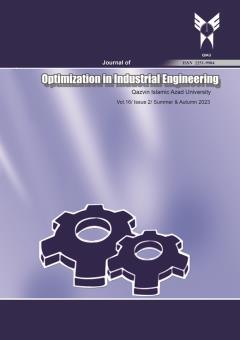The survey of lean implementation maturity level of hospitals in Thailand: Does the hospital type matter?
Subject Areas : Quality theoryKwanchanok Areewong 1 * , Vichayanan Rattanawiboonsom 2 , Robert Van Der Meer 3
1 - Department of Business Administration, Faculty of Business, Economics and Communications, Naresuan University, Phitsanulok, Thailand
2 - Department of Business Administration, Faculty of Business, Economics and Communications, Naresuan University, Phitsanulok, Thailand
3 - Department of Management Science, University of Strathclyde Business School, Glasgow, Scotland, UK
Keywords: Quality Management, TPS, Service Quality, Healthcare,
Abstract :
Purpose: The purpose of this study is to survey the lean implementation maturity level of the hospitals in Thailand and explore the differences across hospital types on lean implementation maturity level. Method: The survey questionnaire was developed from existing literature based on lean practices, lean performances and lean organizational culture, validated by three experts. Data were collected from staff with an experience in hospital lean quality improvement from 160 hospitals in Thailand. Descriptive statistics and T-tests were used to analyze the differences across hospital types on lean implementation maturity level. Results: Most hospitals in Thailand implemented lean at a medium maturity level (33.75%). The regional, non-Health Ministry and private hospitals had higher levels of lean implementation maturity than the general and community hospitals. The regional hospitals had the highest mean scores in all domains but significantly differed in the total mean score and lean activity domain compared with the community hospitals. Conclusion: The regional hospitals, tertiary care units with more speciality, resources and capacity, implemented lean at a higher maturity than other hospital types. Significantly the difference to community hospitals with limited resources, staff and capacity. Further study on the difference across hospital size and hospital capacity on lean implementation should be investigated.
Anand, G and Kodali, R. (2009). Development of a framework for lean manufacturing systems. International Journal Services and Operations Management, 5(5), 687-716. https://doi.org/10.1504/ijsom.2009.025121
Asif, M. Bruijn, E. Douglas, A. and Fisscher, O. (2009). Why quality management programs fail: a strategic and operations management perspective. International Journal of Quality and Reliability Management, 26(8), 778-794. https://doi.org/10.1108/02656710910984165
Brown, S. (1994). The role of work study in TQM. The TQM Magazine, 6(3), 9-15. https://doi.org/10.1108/09544789410057827
Kim, C.S. Spahlinger, D.A. Kin, J.M. and Billi, J.E. (2006). Lean health care: What can hospitals learn from a world-class automaker?. Journal of Hospital Medicine, 1(3), 191-199. https://doi.org/10.1002/jhm.68
Corbett, L.M. (2011). Lean Six Sigma: the contribution to business excellence. International Journal of Lean Six Sigma, 2(2), 118-131. https://doi.org/10.1108/20401461111135019
Dahlgaard, J. and Dahlgaard-Park, S.M. (2006). Lean production, six sigma quality, TQM and company culture. The TQM Magazine, 18(3), 263-281. https://doi.org/10.1108/09544780610659998
Grove, A.L. Meredith, J.O. MacIntyre, M. Angelis, J. and Neailey, K. (2010). UK health visiting: challenges faced during lean implementation. Leadership in Health Services, 23(3), 204-218. https://doi.org/10.2147/jhl.s16322
Hallam, C. and Contreras, C. (2018). Lean healthcare: scale, scope and sustainability. International Journal of Health Care Quality Assurance, 31(7), 684-696. https://doi.org/10.1108/ijhcqa-02-2017-0023
Lander, E. and Liker, J.K. (2007). The Toyota Production System and Art: making highly customized and creative products the Toyota way. International Journal of Production Research, 45(16), 3681-3698. https://doi.org/10.1080/00207540701223519
Liker, J.K. (2004). The Toyota Way: 14 management principles from the world's greatest manufacturer New York: McGrew-Hill Professional. https://doi.org/10.1504/ijhrdm.2010.029445
Liker, J.K. and Hoseus, M. (2010). Human resource development in Toyota culture. International Journal of Human Resources Development and Management, 10(1), 34-50.
Malmbrandt, M. and Ahlstrom, P. (2013). An instrument for assessing lean service adoption. International Journal of Operations & Production Management, 33(9), 1131-1165. https://doi.org/10.1108/ijopm-05-2011-0175
Pettersen, J. (2009). Defining lean production: some conceptual and practical issues. The TQM Journal, 21(2), 127-142. https://doi.org/10.1108/17542730910938137
Urban, W. (2015). The lean management maturity self-assessment tool based on organizational culture diagnosis. Procedia - Social and Behavioral Sciences, 213, 728-733. https://doi.org/10.1016/j.sbspro.2015.11.527
Vanichchinchai, A. (2021). An Analysis of hospital characteristics on lean and service quality. International Journal of Lean Six Sigma, 12(6), 1184-1208. http://dx.doi.org/10.1108/IJLSS-07-2020-0107

